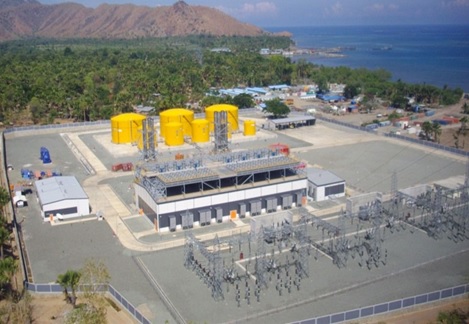As of February 2021, EdTL had an installed generating capacity of 276 MW in four power plants, each of which is fueled by diesel oil: Hera power plant - 119.5 MW (7 units of Wartsila’s W18V46 engines); Betano power plant - 136.6 MW (8 units of Wartsila’s W18V46 engines); Inur Sakato power plant in Oé-Cusse Ambeno enclave - 17.3 MW (4 units of Wartsila 34DF engines), and Atauro Island - 2.6 MW. The power plants are under an operation and maintenance (O&M) contract with Wartsila, which ends in 2022. This O&M contract is likely to be extended until EdTL gains sufficient experience in operating the power plants. However, the combined generating capacities of Hera and Betano power plants are more than sufficient to meet the present load demand and growth anticipated over the next 5 years. The evening peak load, as of March 2020, was 85 MW compared to the combined installed capacity of 256.1 MW (on Timor-Leste). EdTL’s average cost of generation is high, and around two to three times the average retail tariff. Ths is due to the high cost of diesel oil used in these four power plants, which is subject to the volatility of global oil markets.
The challenge for EdTL in going forward will be to significantly reduce the average cost of generation, as elaborated further in this BDP. The most promising option for this would be to take advantage of the country’s excellent solar insolation characteristics to develop ground mounted solar PV plant that would drastically displace generation from the diesel power plants. Another option is the conversion of one of the diesel plants (Hera, Betano, and Inur Sakato) to operate on natural gas/regasified LNG. In this context, TimorGAP, the country’s national oil company, awarded a tender in March 2020 to Wood Group Kenny Energy to undertake the feasibility study for supplying natural gas to the three power plants in Hera, Betano, and Oé-Cusse. This study is expected to be completed by October 2021. When implemented, this is expected to lower the cost of diesel imports and lower the cost of generation, and would also reduce CO2 emissions. Further generation expansion options, such as wind energy and hydropower, areavailable but may have longer lead-times for implementation. During this BDP period, EdTL staff associated with the power generation operations will receive enhanced training so that by the end of this BDP EdTL should be able to take over the power plant operations instead of awarding the O&M contracts to Wartsila.






